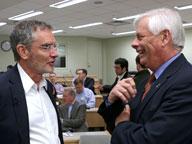Faculty News
—
Prof. William Baumol's book, "The Cost Disease," is cited
—

Excerpt from Forbes -- "Baumol argues that governments around the world have misread the threat posed by increasing healthcare costs because they do not understand that 'the economy’s constantly growing productivity simultaneously increases the community’s overall purchasing power and makes for ever improving overall living standards.'”
Faculty News
—

Excerpt from Forbes -- "Baumol argues that governments around the world have misread the threat posed by increasing healthcare costs because they do not understand that 'the economy’s constantly growing productivity simultaneously increases the community’s overall purchasing power and makes for ever improving overall living standards.'”





















